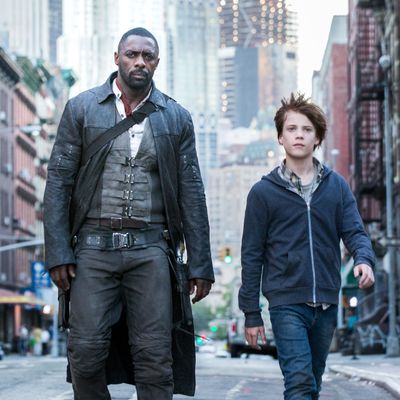
Spoilers for The Dark Tower film below.
Even if you’re not too familiar with the plot or characters of Stephen King’s The Dark Tower novel series, there’s a decent chance that you know one thing about it: It’s long. Like, really long — it spans nine books and more than 4,000 pages of text. The tomes set up an expansive cosmology made up of interconnected fantasy dimensions, each of them filled with wild casts of disparate characters. The primary story line follows the battle between the heroic Roland Deschain and the demonic Man in Black, but subplots and side-stories abound.
In other words, The Dark Tower novels seem perfectly suited to present-day Hollywood, what with its obsession with franchises. Producers and executives who have pondered adapting them into film have long fantasized about the possibility of turning them into a cinematic universe, and as it stands, Sony has been planning to do that with a spinoff prequel TV series. That said, you can be forgiven for thinking the TV material would just be there to tide you over until the next Dark Tower flick. But temper your expectations for the future, Tower fans: The movie really feels like a one-off.
The Nikolaj Arcel–helmed picture may well still get its TV show, but the film has a few aspects that make it seem like the end of the road on screen. Before we go any further, we should note that Sony, King, and Arcel have long said the screen translation would lead to the end of the Dark Tower saga in one way or another. It’s complicated, but basically, the novels say Roland and the Man in Black have been doing their little dance cyclically for countless years, and the plan has been for the story to finally conclude at the cineplex.
But would that ending come after just one movie? That seemed unlikely until recently. For one thing, there’s the meta-story of its performance. The exact box-office returns are unknowable at this point, but a Variety report suggests that test screenings have been somewhat disastrous, leading to major, last-minute recuts. Those are pretty apparent in the finished product, which is extremely rapid-fire and only runs for about an hour and a half — far shorter than one would expect from a franchise-starting tentpole. One doesn’t get the sense that there’s much confidence for more big-screen installments.
Then there’s the ending. (Major spoilers follow here.) The fight between Roland (Idris Elba) and the Man in Black (Matthew McConaughey) pervades the film, but at the end, when they finally go toe-to-toe, Roland shoots and, by all appearances, pretty conclusively kills his foe. At the screening Vulture attended, most of the crowd stuck around as the credits rolled, expecting a mid- or post-credits scene in which McConaughey rises from the grave. No such luck. There’s a little whistling noise at the very end of the credits, which could perhaps be coming from the Man in Black. But if Sony really wanted you to believe there were more Dark Tower movies in store, wouldn’t there be more of a tease than that?
It’s not as if there’s no hope for a sequel, however. Beyond the aforementioned whistling, there’s also the fact that Roland and his sidekick Jake Chambers (Tom Taylor) agree to stick together as partners and venture off into a portal in the final scene. But we’ve been told at that point that the primary evil in the universe has been killed off (we even see the Man in Black lying on the ground with a bullet hole in his head, so there’s no “where’s the body” loophole), so where’s the excitement for what they could be doing next? It’s hard to imagine anything narratively topping their victory. Never say never, but there’s not a lot of reason to hope for The Dark Tower II: Electric Towerloo.

